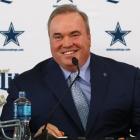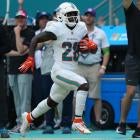The perception is Mike McCarthy was a conservative playcaller who didn't utilize one running back enough. The reality is McCarthy deserves credit for being a quarterback developer who, if anything, trusted his passing game a little too much.
Another reality: McCarthy will not call plays for the Cowboys offense. Another perception shattered.
McCarthy replaces Jason Garrett, giving them the best available person to further refine Dak Prescott. The timing's pretty good as Prescott's coming off a career-best season (4,902 passing yards, 30 touchdowns) and should be in line for at least a one-year contract via the franchise tag, if not a lucrative multi-year deal. Expect McCarthy to try improving Prescott's footwork, delivery and decision making, something he did to help make Brett Favre and Aaron Rodgers more efficient.
It will also help Prescott that his playbook won't change. Despite once saying he would "never" give up calling plays, McCarthy decided to let offensive coordinator Kellen Moore continue in his role, which includes keeping the playbook the same and letting the second-year playcaller continue to shape the game plan each week.
"I thought he did a very good job, so I want to keep the language on offense the same," McCarthy said in mid-January. "I'm confident that Kellen can still be the play-caller. That's the path we're going down."
For the record, the Cowboys' offense ranked first in the NFL in yards from scrimmage last season, so it might not have been that tough of a decision for McCarthy. And, for the record, McCarthy has snatched playcalling duties from offensive coordinators before, so just because Moore is getting the shot now doesn't mean he'll keep it long-term. He's already mentioned that this is a plan just for his first year and that things can change.
So instead of diving into McCarthy's tendencies from his 13-year run in Green Bay, we're digging into Moore's 2019 with the Cowboys, his only year calling plays.
Run-pass ratio
Note: McCarthy was 60-40 pass with the Packers
Despite the passing tendencies from both coaches, I'd expect both numbers to decline a little bit in 2020. With Ezekiel Elliott and a bullying offensive line at the Cowboys' disposal, don't be shocked if McCarthy asks Moore to rely a little more on the run, certainly more than McCarthy did when he was in Green Bay. This doesn't mean Prescott won't be a good Fantasy quarterback, but it does mean we'll have to hope for a little more efficiency from him. The good news is that McCarthy is a specialist at exactly that. Prescott should be one of the first six or seven quarterbacks taken in drafts.
RB rushes per game
Note: McCarthy averaged 22.0 per game with the Packers
The Cowboys were one of the more run-friendly teams in football last year, and should be again in 2020. McCarthy inherits an in-his-prime Ezekiel Elliott, a gentleman who has averaged 20.9 carries per game over his career. McCarthy might love quarterbacks but he'd be a buffoon to not maximize Elliott's skills. And Moore already knows how Zeke rolls, so this shouldn't change at all.
As for those worried about McCarthy spoiling Elliott's potential, keep in mind that over the past 14 years the Packers rarely dedicated major draft capital or free-agency bucks to running backs. Hello, they had Rodgers, they didn't need to build up a big run attack.
I think it would take an infatuation with Prescott for McCarthy to get away from the Cowboys' run game, and that's something that just doesn't seem likely. Prescott will throw plenty, but Elliott (and maybe a little bit of Tony Pollard) should be expected to buoy the offense. Elliott remains a very early first-round Fantasy choice with Pollard a priority backup in Round 9 or 10.
Reception distribution
Note: McCarthy averaged 20% to his running backs, 62% to his receivers and 18% to his tight ends with the Packers
This is where McCarthy and Moore should be in lockstep. Amari Cooper and Michael Gallup were already featured components of the Dallas offense — that's not going to change (unless Cooper leaves via free agency, of course). They're both good route runners with the physicality and hands to win one-on-one matchups. Moore already has a feel for how they can be used successfully and McCarthy shouldn't get in the way of that. Gallup specifically could be among the best Fantasy values if he's a Round 6 or 7 pick, which he was in our first mocks of 2020. Receivers coming off an 1,107-yard campaign shouldn't go that late, especially if they're going to get a shot at a huge share of receptions.
Despite the 24% reception share for tight ends in Dallas, Jason Witten's numbers shouldn't be expected to improve. Not that many Fantasy managers care. Witten's already on his last legs and could be bound for retirement again. If so, Blake Jarwin doesn't profile as a breakout candidate. For what it's worth, the only time McCarthy's tight ends enjoyed more than a 21% share of the receptions was in 2009 when Jermichael Finley and Donald Lee combined for 92 catches.
As for the running backs... look, you'd love for that number to be higher. But despite the 18% reception share, Elliott caught 54 passes in 2019. He's had at least 50 receptions in each of his past two seasons despite the Cowboys running backs (mostly Elliott) failing to get more than 17% of the total share either season. If the Cowboys' pass-run ratio were to slide closer to 55-45, that would probably mean a drop-off in catches for Elliott, but it would also presumably mean an uptick in carries for him. He's in a no-lose situation. Draft accordingly with a top-three pick.




























